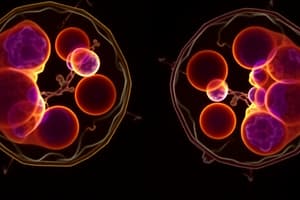Podcast
Questions and Answers
What is the longest phase of the cell cycle?
What is the longest phase of the cell cycle?
- Mitotic Phase
- S Phase
- G1 Phase (correct)
- G0 Phase
In which phase does DNA replication occur?
In which phase does DNA replication occur?
- Anaphase
- Prophase
- G2 Phase
- S Phase (correct)
Which of these correctly identifies the components of the mitotic phase?
Which of these correctly identifies the components of the mitotic phase?
- Mitosis and Cytokinesis (correct)
- G0 Phase and S Phase
- Prophase and Telophase
- G1 Phase and G2 Phase
What is the sequence of stages in the mitotic phase?
What is the sequence of stages in the mitotic phase?
Which phase directly follows metaphase during mitosis?
Which phase directly follows metaphase during mitosis?
What is the main reason for cell division in tissues like the skin and bone marrow?
What is the main reason for cell division in tissues like the skin and bone marrow?
What type of cell division is responsible for the production of gametes in sexual reproduction?
What type of cell division is responsible for the production of gametes in sexual reproduction?
What genetic feature do offspring produced through sexual reproduction possess?
What genetic feature do offspring produced through sexual reproduction possess?
Which of the following processes occurs in asexual reproduction?
Which of the following processes occurs in asexual reproduction?
Which type of cells are usually produced in the process of meiosis?
Which type of cells are usually produced in the process of meiosis?
What is a primary characteristic of asexual reproduction?
What is a primary characteristic of asexual reproduction?
What are the results of typical cell division?
What are the results of typical cell division?
Which statement correctly describes mitosis?
Which statement correctly describes mitosis?
When do cells typically decide to divide?
When do cells typically decide to divide?
Which of the following is an exception to the typical results of cell division?
Which of the following is an exception to the typical results of cell division?
What is the main purpose of cell division?
What is the main purpose of cell division?
Which of the following statements best defines cellular immortality?
Which of the following statements best defines cellular immortality?
What are cancer cells known for in relation to cell division?
What are cancer cells known for in relation to cell division?
Which process is primarily responsible for the formation of new cells from existing cells?
Which process is primarily responsible for the formation of new cells from existing cells?
Why are stem cells significant in biological research?
Why are stem cells significant in biological research?
What limits the ability of cells to replicate?
What limits the ability of cells to replicate?
What role does the cell cycle play in cellular functions?
What role does the cell cycle play in cellular functions?
Which of the following best describes the outcome of a cell undergoing mitosis?
Which of the following best describes the outcome of a cell undergoing mitosis?
What occurs during the G1 phase of the cell cycle?
What occurs during the G1 phase of the cell cycle?
What is the primary purpose of the G2 checkpoint?
What is the primary purpose of the G2 checkpoint?
What happens during the S phase of interphase?
What happens during the S phase of interphase?
What is synthesized during cytokinesis?
What is synthesized during cytokinesis?
Which phase of the cell cycle involves the dismantling of the cytoskeleton?
Which phase of the cell cycle involves the dismantling of the cytoskeleton?
Flashcards are hidden until you start studying
Study Notes
Cell Biology: Cell Cycle
- Cells arise from pre-existing cells by cell division.
- Cells divide for growth, development, repair, and reproduction.
- There are two main types of cell division:
- Mitosis: Produces two genetically identical daughter cells
- Meiosis: Produces four genetically different daughter cells (gametes)
- The cell cycle is divided into two main phases:
- Interphase: The cell grows, duplicates its organelles, and replicates its DNA.
- Mitotic phase (M phase): The cell divides its replicated DNA and cytoplasm.
- Interphase is further divided into three sub-phases:
- G1 phase (First Gap): Cell increases in size and volume.
- S phase (Synthesis): DNA is replicated.
- G2 phase (Second Gap): Cell increases in size again, duplicates organelles, and prepares for mitosis.
- The cell cycle is regulated by checkpoints to ensure that everything is ready for the next stage.
- G1 checkpoint: Checks if the cell is large enough and the environment is suitable for division.
- G2 checkpoint: Checks that DNA replication is complete and there are no errors in the replicated DNA.
- Cancer cells are cells that have lost the ability to control their cell division. They divide uncontrollably, leading to tumor formation.
- Stem cells are undifferentiated cells that have the potential to develop into different types of cells. They are important in research, potentially leading to cures for diseases like cancer and Alzheimer's disease.
- Immortal cell lines are cells that can divide indefinitely in culture. They are valuable research tools because they allow scientists to study cell processes without the limitations of normal cells.
- Mitosis is divided into four phases:
- Prophase: Chromosomes condense, nuclear envelope breaks down, and spindle fibers form.
- Metaphase: Chromosomes align at the equator of the cell.
- Anaphase: Sister chromatids separate and move towards opposite poles of the cell.
- Telophase: Chromosomes decondense, nuclear envelope reforms, and the cytoplasm divides.
- Cytokinesis: Division of the cytoplasm, typically following mitosis or meiosis, resulting in two daughter cells.
- The correct order for the phases of mitosis is: Prophase, Metaphase, Anaphase, Telophase.
Studying That Suits You
Use AI to generate personalized quizzes and flashcards to suit your learning preferences.




